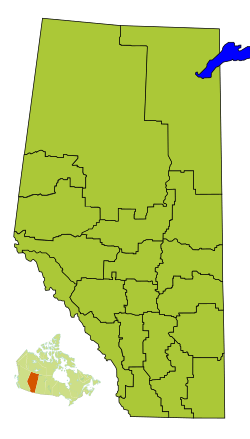Division No. 17, Alberta facts for kids
Quick facts for kids
Division No. 17
|
|
|---|---|
|
Census division in Alberta
|
|
| Country | Canada |
| Province | Alberta |
| Area | |
| • Total | 192,116 km2 (74,176 sq mi) |
| Population
(2021)
|
|
| • Total | 62,132 |
| • Density | 0.323409/km2 (0.837625/sq mi) |
Division No. 17 is a special area in Alberta, Canada. It's called a census division because Statistics Canada uses these areas to count people and gather information. This division covers a huge part of central and northwest northern Alberta. It's the biggest census division in Alberta by size, but it has the fewest people living in it compared to its area. The largest town here is Slave Lake.
Contents
What is a Census Division?
A census division is like a big region that Statistics Canada uses to organize information about people. It helps them understand how many people live in different parts of the country. Division No. 17 is one of these important areas in Alberta.
Communities in Division No. 17
Division No. 17 is home to many different types of communities. These are called census subdivisions. They include towns, villages, and areas where First Nations people live.
Towns
Some of the towns you can find in Division No. 17 are:
Villages
There are also smaller communities called villages, such as:
Hamlets
Hamlets are even smaller communities. Some in this division include:
Municipalities
Larger areas that manage their own services are called municipalities. These include:
First Nations Communities
Many First Nations communities are located within Division No. 17. These are special areas called Indian reserves or Indian settlements. They are home to various First Nations, including:
- Tallcree First Nation (like Beaver Ranch 163)
- Dene Tha' First Nation (like Bushe River 207)
- Little Red River Cree Nation (like Fox Lake 162)
- Driftpile First Nation (like Drift Pile River 150)
- Kapawe'no First Nation (like Kapawe'no 150B)
- The Paddle Prairie Metis Settlement is also located here.
Population Information
| Historical population | ||
|---|---|---|
| Year | Pop. | ±% |
| 1991 | 48,962 | — |
| 1996 | 54,709 | +11.7% |
| 2001 | 57,508 | +5.1% |
| 2006 | 59,282 | +3.1% |
| 2011 | 61,504 | +3.7% |
| 2016 | 61,590 | +0.1% |
| 2021 | 62,132 | +0.9% |
In 2021, Statistics Canada counted the people living in Division No. 17. The total population was 62,132 people. This was a small increase from the 61,590 people counted in 2016.
Because Division No. 17 is so large (about 190,433 square kilometers), it has a very low population density. This means there aren't many people living in each square kilometer. It's a vast area with lots of open space!
 | Chris Smalls |
 | Fred Hampton |
 | Ralph Abernathy |


